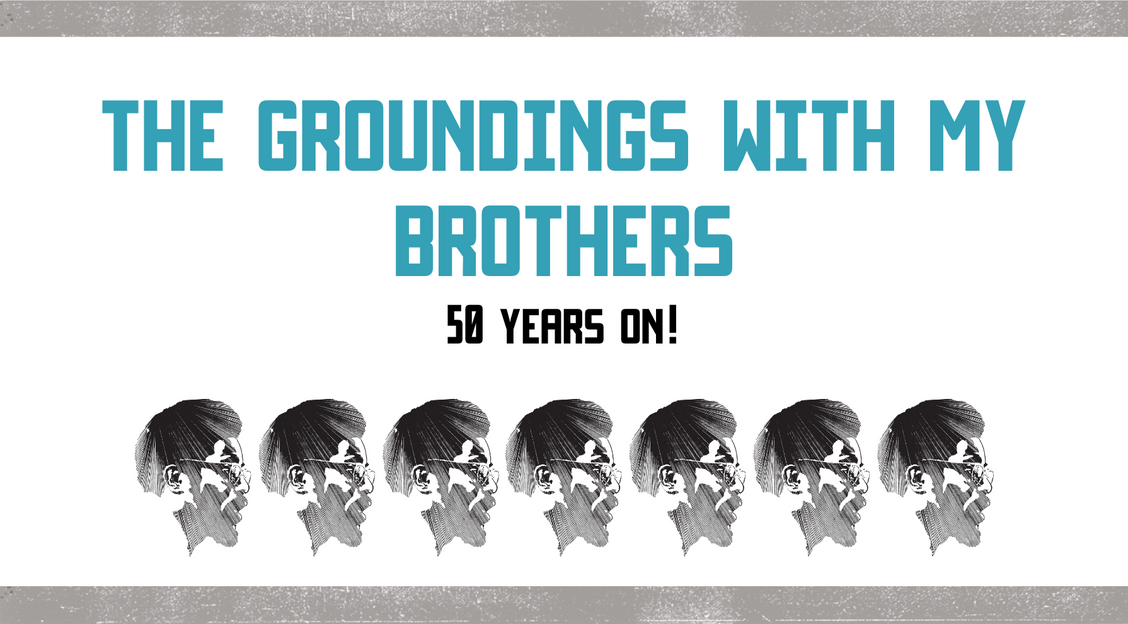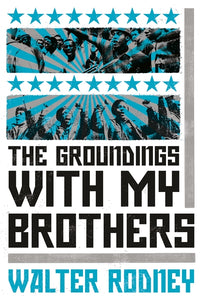The Groundings With My Brothers at Fifty
In this excerpt from The Groundings with My Brothers, author and educator, David Austin, reflects on Walter Rodney’s vital text, 50 years on.

In this, one of five commentaries from the The Groundings With My Brothers, author and educator, David Austin, reflects on Walter Rodney’s vital text, 50 years on.
See all our reading on Walter Rodney here.
I first encountered The Groundings with My Brothers as a high school student in the late 1980s, at Third World Books and Crafts in Toronto. I was finding my way in the world, and reading Walter Rodney alongside Malcolm X, Frantz Fanon and C. L. R. James was a crucial part of my political and intellectual development. As a child of Jamaican parents, and as someone who had been attuned to Jamaican politics at an early age, I was struck by Rodney’s acute analysis of Jamaican society. But the impact of The Groundings on me went even further, influencing my decision to study in Montreal, the city where I had spent part of my childhood. The move was motivated by the discovery that three of The Groundings’ chapters were based on speeches that Rodney delivered in Montreal during and just after the historic Congress of Black Writers (11–14 October 1968), and I wanted to discover why this city had been such an important site of black radical politics, a phenomenon that I have since explored.
In 1968 Walter Rodney was an academic who, despite his youthful twenty-six years of age, had already established a name for himself in Tanzania, England and Jamaica as a first-class historian. But it was politics that brought Rodney to Montreal, and his participation in the Congress of Black Writers was not only important for the event but also marked a significant turning point in his political life when the coincidence of his participation in the Congress and his expulsion from Jamaica by the government of Hugh Shearer thrust Rodney onto the international stage.
It is interesting to note here that it was Robert Hill who was better known to members of the Congress organizing committee, and that Rodney was not listed as a speaker in the initial Congress program. According to Raymond Watts, who initiated the Congress of Black Writers, Rodney was added at the eleventh hour, following a phone conversation between Montreal and Jamaica. But the Congress co-chair and future prime minister of Dominica, Rosie Douglas, had anticipated the importance of Rodney’s contribution to the event in a McGill Daily interview that was published on the eve of the Congress. First describing Hill’s relationship with Rastafarians in Jamaica, he then turned to the central role that Hill had played in organizing various events sponsored by the Caribbean Conference Committee in Canada, including a series of conferences in Montreal that had anticipated the Congress of Black Writers. He also described Hill as someone who was now back in Jamaica engaging in an important study of the Garvey movement, and he mentioned a young historian who had travelled from Jamaica with Hill, referring to Rodney as being just ‘as committed as Bobby’. Douglas presciently argued that the participation of the duo in the Congress would be vital to the event and that they might in fact be the surprise of the entire conference. He also accurately prophesied that the public would be hearing much more from the two in the months and years to come.
In the lead-up to the Congress, Hill and Rodney had collaborated in the grounding sessions in Jamaica for which he has since become famous, and as I have mentioned, three of the book’s chapters are based on presentations that Rodney delivered in Montreal in October 1968. ‘Statement of the Jamaica Situation’ (co-authored with Robert Hill) and ‘African History in the Service of Black Liberation’ were delivered during the Congress of Black Writers, and ‘The Grounding with My Brothers’ was delivered after the Congress.
‘Statement of the Jamaica Situation’ exposed the myth behind Jamaica’s multiracial motto, ‘Out of many, one people’, and championed the ‘epochal march forward of the Black Humanity’. For Rodney the mood and movement of Jamaica’s black sufferers was typified in the spirit and example of Rastafari, which rejected all the trappings and symbols of official ‘Babylonian’ society. But it was also evident in the government’s desperate attempts to maintain the façade of plurality in the face of abject poverty and social inequality that was exemplified in the oppression of Jamaica’s sufferers; the ban on Stokely Carmichael, James Forman and H. Rap Brown from entering the country; and the proscription of literature by Carmichael, Malcolm X and Elijah Muhammad. State repression was used against the restless black poor majority, including savage attacks by black police officers, who, as Rodney duly noted, employed, in the name of order and security, as much brutality as white officers in the US. But Rasta, and the black consciousness that was in part inspired by US Black Power, meant an interest in ‘things African’ and black, challenging the epistemological order. Even police brutality pointed the way forward for young blacks who were increasingly ‘becoming aware of the possibilities of unleashing armed struggle in their own interests’.
Despite being a late addition, Rodney played a pivotal part in the Congress of Black Writers, making timely interventions on a range of issues as well as introducing the ‘big three’ participants – James Forman, Harry Edwards, and finally Stokely Carmichael, who was at the peak of his rhetorical and political prowess at the moment and, as the primary exponent of the Black Power movement, was the most anticipated speaker of the entire Congress. And it was Rodney who had the last word at the Congress when he closed the event by inviting delegates to a post-Congress caucus. When it was all over, the participants and, via the media, members of the general public were very familiar with the name Walter Rodney.
In ‘African History in the Service of Black Liberation’ that Rodney demonstrated the erudite command of history for which he would become renowned. The presentation also gave his audience a glimpse of his capacity to bring history to life by linking the past with the present, making history plain. Rodney also avoided what we might describe as the ‘great kings and queens’ syndrome, which measured a society’s worth based on the existence and power of monarchies, the size of its army, its political structure, its literature, and so forth. Rodney rejected this conception of civilisation – setting him at odds with Richard B. Moore during the Congress – in favour of more egalitarian concepts that reflected the ways in which people related with one another in a given society: the culture of hospitality, the principle of gerontocracy, and the practice of law
in Africa.
But having presented his overview of African history to a primarily North American and Caribbean audience, Rodney suggested that apart from its cathartic value, African history was more relevant to the social development of Africa, and that it was instead the history of blacks in the ‘New World’ that would better serve as a tool for developing a ‘revolutionary strategy’ for the Americas. This was perhaps his way of suggesting that as important as it was for us to acquire knowledge of our African past, this was no substitute for being grounded in the more particular experiences and histories that have shaped us in the Americas.
‘The Grounding with My Brothers’ presentation was delivered following Rodney’s expulsion from Jamaica by the government of Hugh Shearer; but, as Rodney argued, it was a mistake for the government to believe that it could somehow halt or stall the movement of Jamaica’s black masses against racialised class oppression simply by banning him from the country. Invoking a poem recited by Ted Joans at the Congress, ‘Integrated Nigger’, or what Joans also called ‘The Nice Colored Man’, Rodney challenged the myth of a multiracial integrated Jamaican society, and he once again recalled the spirit of Rastafari as the penultimate example of black Jamaica’s rejection of the society that had derided, despised and dismissed it.
As Afro-Jamaicans looked towards the African continent, Rodney also called upon black academics and intellectuals to attack the ‘distortion of white imperialism, white cultural imperialism’, as he had attempted to do in his presentation on African history at the Congress: for intellectuals to move beyond the myth of Jamaica as a multiracial society and to attach themselves to the struggles of the black majority. This is precisely what Rodney himself had done during the grounding sessions in Jamaica, sharing his experience and knowledge of history and society with Jamaica’s dispossessed in some of the most economically deprived neighbourhoods in the country. These groundings contributed to the emergence of a black political consciousness in the country and highlighted the importance of blacks speaking to each other without outside interference, another point that he had highlighted during the Congress of Black Writers.
Lastly, Rodney reiterated his respect for Rastafarians and their philosophy, recalling how they had taught him, during his ongoing exchanges with them in Jamaica, humility, among other things. It was the class of sufferers, whose potential was expressed in their artistic creativity, who held the key to the country’s future.
Given the events that surrounded Rodney's expulsion from Jamaica, it perhaps makes sense to understand Rodney's presentations in Montreal as part of an extended, interconnected discourse in which each presentation complemented the other. What is clear is that Rodney's presence and presentations in Montreal announced him as an important Pan-African political figure who was beginning to exercise his voice on the world stage.
- The Groundings With My Brothers, by Walter Rodney, is out now.
See all our reading on Walter Rodney here.
[book-strip index="1" style="buy"]